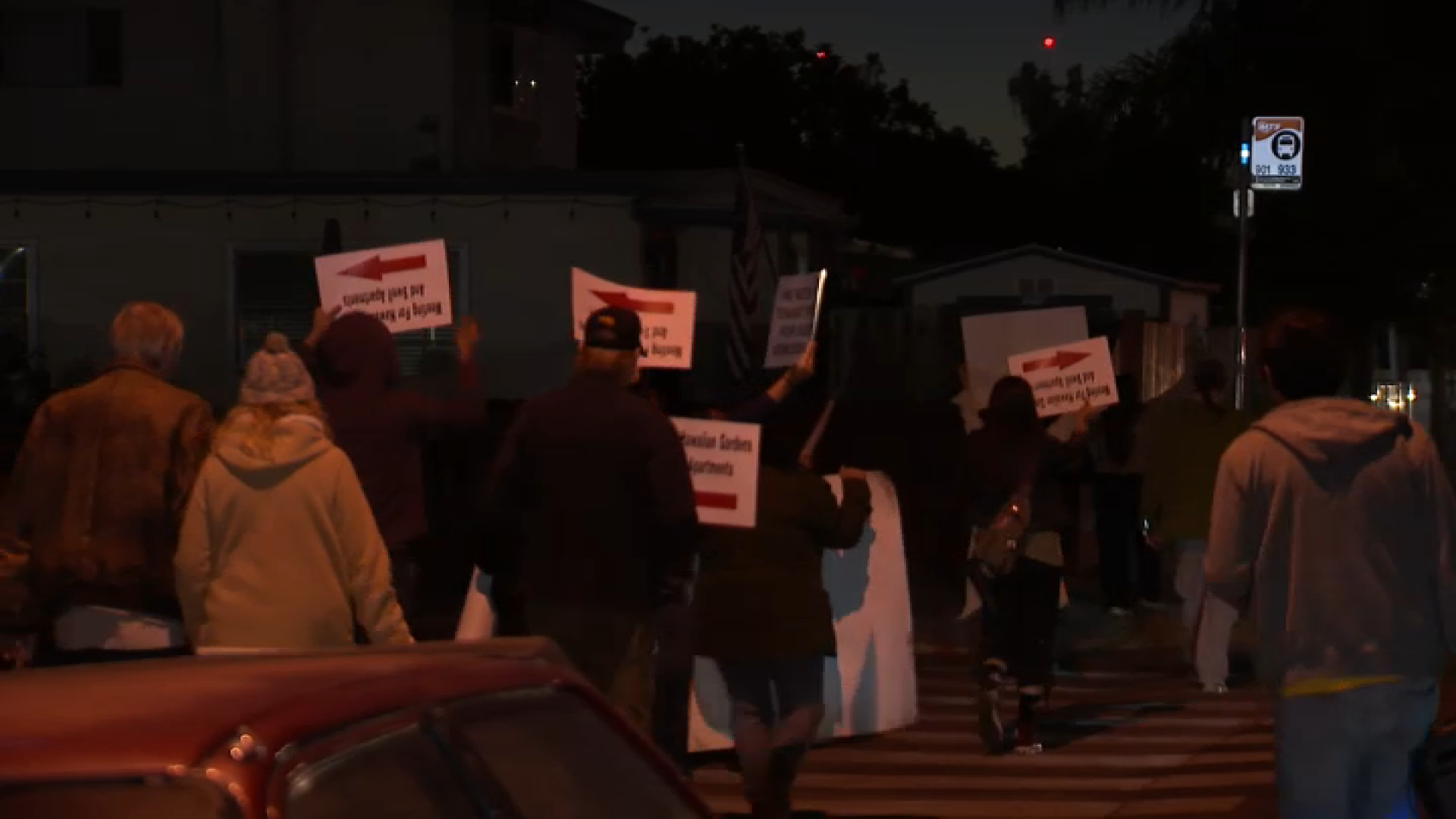San Diego County Board of Supervisors Chair Nora Vargas Wednesday evening outlined the progress she and her colleagues made over the past year, including more housing, and helping migrants and those living on the street, in her second State of the County speech.
Speaking at the Performing Arts Center in Southwestern College, where she once studied, Vargas said she was ready to share a year of "getting stuff done," or "hashtag GSD."
"I am thrilled to be here with you today," Vargas said, adding it was "really heart-warming to be back where it all started in more ways than one." Speaking at the South Bay college -- part of District 1, which Vargas represents -- "is like coming home to me," she added.
"I want you to know that as I stand before you today, I stand on the shoulders of so many trailblazers that have made their own imprint on our community, and in doing so made it possible for me to serve the community I love," Vargas said.
Get top local stories in San Diego delivered to you every morning. Sign up for NBC San Diego's News Headlines newsletter.
Vargas discussed how county employees and volunteer groups spent numerous hours helping area residents whose homes and lives were devastated by severe rain storms on Jan. 22.
In response, Vargas rescheduled the annual address, which was set for earlier this month. During a Day of Service in late January, over 1,000 volunteers helped 1,000 affected families, Vargas said.
Local
Volunteers also dropped off donations and filled sandbags, Vargas added, describing those who pitched in as "truly a reflection of who we are as San Diegans."
Citing President Joe Biden's announcement Monday about federal assistance for damaged San Diego neighborhoods, Vargas said those in need "can count on us. We're gonna be there fighting for you."
"When we work together, there's nothing we can't overcome or accomplish," she added.
As a first-generation immigrant from Mexico, Vargas said the challenge the county now faces with migrants entering the United States via San Diego County strikes close to her heart.
Between 700 and 900 migrants cross the border per day, which overwhelms the county's capacity to help and strains resources, Vargas said.
She credited her fellow supervisors for approving a total of $6 million last fall to assist asylum seekers with basic need as the crisis escalated and praised various immigration advocate groups for their efforts.
Vargas said she sent a letter to Biden asking his administration to provide $1.5 million per month needed to operate a migrant transitional center.
"Ignoring the (migrant) issue doesn't make it go away," Vargas said.
With county funding ending this week and asylum-seekers being displaced, "the time for the federal government to step up is now," Vargas said.
"As an immigrant, I'm not going to turn my back on human beings seeking asylum," Vargas added.
In order to truly thrive, the county needs "to make sure that everyone, from every corner of San Diego, has a shot to build a better life for themselves and their families," Vargas said, and that includes tackling homelessness.
Vargas said the county received $22 million from the state government to deal with the problem of encampments, including the Sweetwater Riverbed, which has been place where homeless people lived for decades.
Vargas said it was a shame there are growing numbers of senior citizens and veterans living on the streets in California,. She credited a $5 million county rental subsidy program for keeping 382 seniors in their homes.
"These are real human beings," Vargas said, mentioning a 76-year-old woman named Marjorie who benefited from the subsidy program. "This is how we truly make government work for all, not just for some," the board chairwoman added.
Vargas touted another success story -- approving $10 million for the Recovery Action Fund for Thursday to give families and seniors $4,000. To help veterans, the county last July launched the Leave no Veteran Homeless Initiative, Vargas said.
By working with 20 community organizations, the Regional Task Force on Homelessness, the Veterans Administration, landlords and San Diego city government, the county helped 415 veterans find housing, Vargas said the county is sticking by its promise that "no veteran gets left behind."
As part of county efforts to reduce homelessness, Vargas touted improvements in mental health care, including early support for the CARE Act pilot program, which focuses on helping people with untreated serious mental illnesses such as schizophrenia via the civil courts.
Based on feedback from behavioral health experts, medical professionals and justice advocates, Vargas said the county is "committed to creating the right infrastructure" to implement state Senate Bill 43 by making sure the right treatment options are available.
"Together we are setting a comprehensive plan to fully implement SB 43, one year before the deadline," she added. "I've never been afraid to make San Diego a leader on issues like this. I'm not afraid to go first ... but also insist that when we do something, we do it right and we do it well."
Vargas noted that supervisors also passed a resolution supporting Proposition 1, the measure on the March 5 primary election ballot that calls for the authorization of $6.83 billion in bonds to build mental health and substance abuse treatment facilities.
Along with clinics, community centers and organizations that assist those on the street, and LGBTQ and Latino residents, Vargas also praised health workers known as "promotores" who connect people to vital resources.
During 762 events, promotores touched the lives of 49,000 people, Vargas said, calling them unsung heroes.
"May the bridges you build stand strong," she added.
Vargas said she believes housing is a fundamental human right, and cornerstone of dignity and opportunity. She said the county has worked to ensure that San Diego became a "pro housing" jurisdiction from the state, as a way to unlock additional funding allows for more homes to be built at a faster rate.
In 2023, supervisors approved $14.5 million for the "Removing Barriers to Housing" initiative that helps renters and home buyers, Vargas said.
By teaming up with two companies, the county preserved 151 units of affordable housing in a Chula Vista apartment complex for the next 50 years, Vargas said. Vargas noted that last year, construction began on 750 units, while 500 homes were completed and over than 1,100 homes were built in the county.
The board has approved over $45 million in infrastructure projects, Vargas said, adding the county is committed to communities where residents can live near public transportation and job centers.
Vargas said cross-border pollution, especially the kind affecting beaches, remains a major challenge. Some county beaches have been closed for 805 consecutive days due to sewage contamination, she said, adding the county has pursued funding for clean-up efforts and declared a local state of emergency.
"We won't back down until we have clean water and beaches for the residents and visitors to San Diego County," Vargas said.
Greater deployment of air sensors in the Tijuana River Valley and nearby communities like Imperial Beach will allow the county to share data with residents and research institutions,.
"I acknowledge that a lot of work needs to be done to clean up our region's cross-border pollution but I want to let you know that my fight for cleaner air has only just begun," Vargas said.
Vargas said the San Diego Air Pollution Control District board, of which she is a member, "took a bold step" by adopting requirements that resulted in 1,629 residences, one park and 59 businesses "being shielded from elevated health risks, including hidden dangers that can cause cancer."
The Air Pollution Control District board also has a program helping small landscaping business replace their gasoline-powered equipment with zero- emission alternatives, Vargas added.
A program aims to further reduce emissions by assisting small landscaping businesses in replacing gasoline lawn and garden equipment with zero emission alternatives.
One major environmental initiative is transforming the Tijuana River Valley Park into a world-class sports complex and recreation spot, with biking trails and parks, which Vargas dubbed "The Gateway to the Californias."
She said the project will "be a source of pride for our binational community," one the county hopes to promote during World Design Capital 2024 events.
Vargas touted other county accomplishments, including improved youth ridership on public transit via the Pronto card phone app, planting over 10,000 trees in various communities, and the new Child and Family Well-Being Department.
"There's nowhere I'd rather be than right here in San Diego County," Vargas said towards the end of her speech which ran for slightly more than an hour. "We are strong, we are vibrant, and we are an inclusive community with a booming economy."



